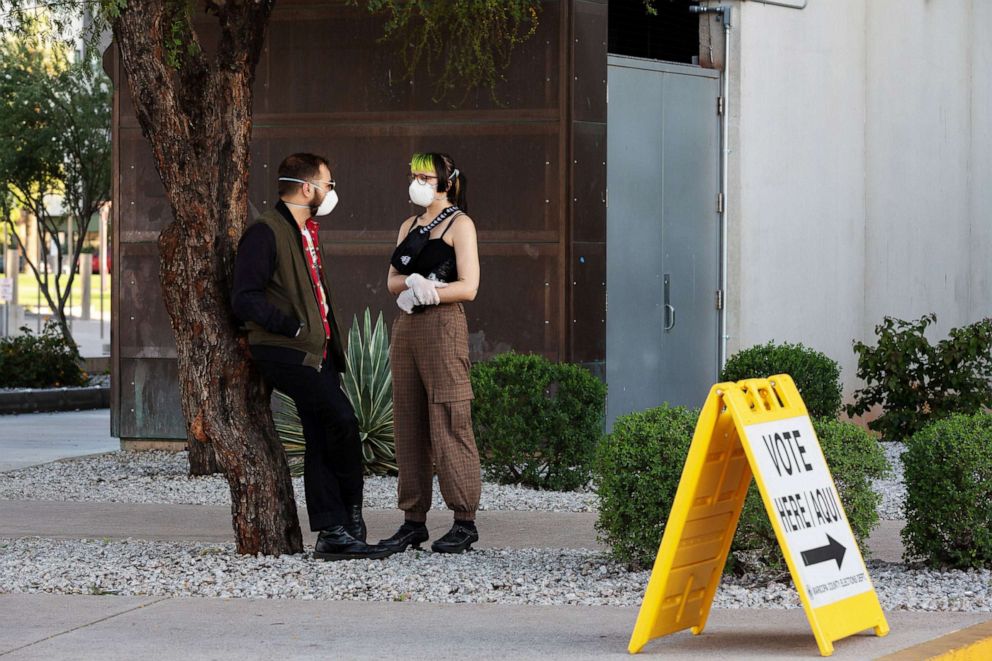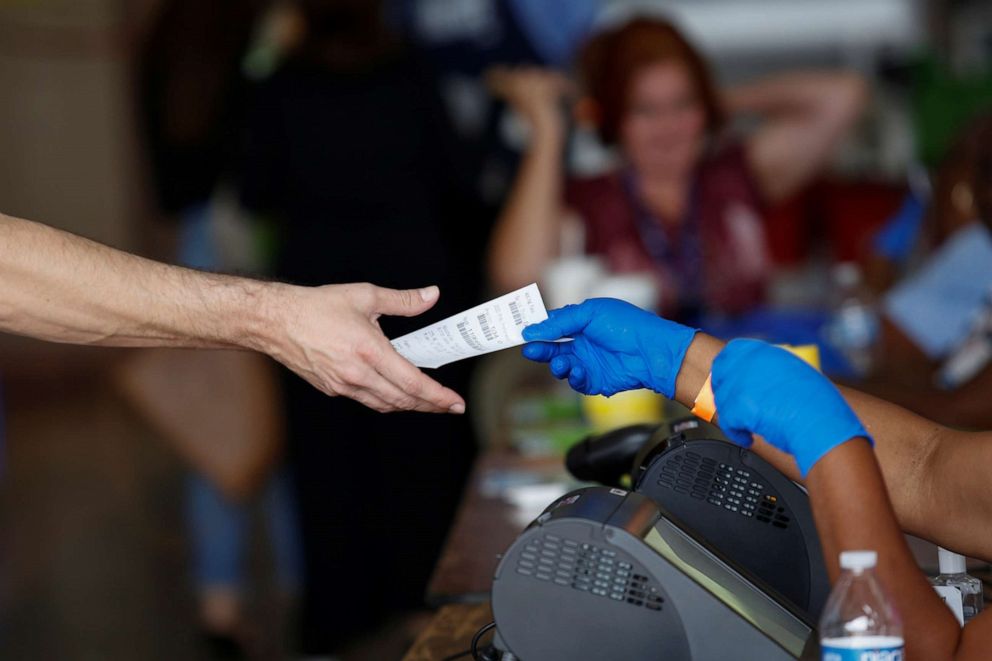How experts worry the coronavirus outbreak could cloud the 2020 general election
The stage is set for a messy election process -- if it takes place on schedule.
The coronavirus outbreak in the United States has wreaked havoc on the presidential primary calendar, upending elections at least fifteen states, plans for summer nominating conventions and how millions of Americans will cast ballots.
While concerns from some Democrats that President Donald Trump could try to postpone the general election are largely unfounded, given the difficulty of changing the law setting out the date of the election, some experts worry that expanding voting by mail could increase the likelihood of potential voter fraud.
Some states, especially those that have struggled to manage past elections, could drown under an unprecedented number of mail-in ballots, potentially delaying election results well past Nov. 3. Potential health edicts could add another layer of confusion to election administration in some regions.
"What if people are not allowed to go outside during some portion of this? What if that order came down in a state like North Carolina or Pennsylvania? If people in Detroit have to stay home, that could sway the state of Michigan one way or another," said Rick Hasen, a University of California, Irvine law professor and election law expert.
It all could set the stage for a messy process -- even if it all takes place on schedule.
Tune into ABC at 1 p.m. ET and ABC News Live at 4 p.m. ET every weekday for special coverage of the novel coronavirus with the full ABC News team, including the latest news, context and analysis.
Coronavirus disrupts primary calendar, convention plans
Several states are preparing to expand mail-in voting for upcoming elections as well as the general election: Maryland, which pushed back its presidential primary from April to June 2, made the special election to fill the House seat of the late Rep. Elijah Cummings a mail-in only election.
In Wisconsin, which is still proceeding with plans for an April 7 primary, election officials have seen an unprecedented volume of absentee ballot requests: over one million ballots have been sent for next Tuesday's contest, compared to the 845,031 that were sent for the general election in November 2016.
But not everyone is comfortable with moving forward: Sen. Bernie Sanders, I-Vt., on Wednesday called on Wisconsin to push back its Democratic presidential primary.
"People should not be forced to put their lives on the line to vote," he said in a statement.

The outbreak has even raised questions about the wisdom of Democrats and Republicans holding large nominating conventions in Milwaukee and Charlotte.
While the Republican National Committee has signaled plans to move forward with its late August convention, former Vice President Joe Biden, appearing on MSNBC Tuesday night, suggested that "it's hard to envision" the DNC taking place in mid-July.
The Democratic National Convention on Thursday pushed back its convention to Aug. 17, the week before the GOP convention is currently scheduled to take place.
Lawmakers on Capitol Hill and in statehouses around the country are debating how to best protect voters in both rescheduled primaries, and the general election, given concerns about large gatherings at polling places in the middle of the pandemic.
Biden on Tuesday said Americans "ought to be able" to vote despite the pandemic, but acknowledged that "it may have to be different" with expanded absentee voting.
Sens. Amy Klobuchar, D-Minn., and Ron Wyden, D-Ore., have pushed for expanded mail-in voting as a direct response to the coronavirus outbreak.
"In the midst of this crisis, we must also remember to protect the foundation of our democracy by ensuring that every eligible American can safely cast a ballot in the upcoming elections," they wrote in a Washington Post op-ed. "The coronavirus should not stop our citizens from casting their ballots."
Congressional efforts to stave off the impact on elections fall short of need, experts say
Congress included $400 million to address the impact of coronavirus on elections. The funding, which Democrats say can be used to help states expand mail-in voting and online registration, is far less than the $4 billion House Democrats wanted to help prepare states and encourage them to expand absentee voting opportunities.
Senate Republicans pushed back, arguing that Democrats wanted to "permanently override state control of elections" with a federal mandate for early and mail-in voting, according to a Senate GOP summary of the package.
"The things they had in there were crazy," Trump said Monday in a "Fox and Friends" interview about Democrats' efforts to expand absentee voting, adding that "if you ever agreed to it, you'd never have a Republican elected in this country again."

Just five states use only mail-in ballots: Colorado, Hawaii, Utah, Washington and Oregon. Roughly two dozen additional states and territories have some form of early voting, and another sixteen states allow in-person absentee voting, according to the National Conference of State Legislatures.
"If we're still in the midst of this pandemic, vote by mail is going to expand everywhere," Hasen, the author of "Election Meltdown," a study of the potential threats to the 2020 election and voting systems, told ABC News.
Election analysts, along with experts from both parties, worry that increased absentee and mail-in balloting could create more opportunities for fraud, on the heels of the alleged absentee ballot fraud in North Carolina's Ninth Congressional district, that led state election officials to throw out the results of the election and hold a special election in September 2019.
"Even people who are relatively less concerned about voter fraud and more concerned about accessibility will agree that there's a greater risk with mail-in ballots," David Mason, a Republican former Federal Election Commission member who served from 1998 to 2008, told ABC News.
Given that election results can take weeks to tabulate in states and regions with experience managing mail-in voting, such as California, experts worry that an expansion across the country in dozens of states could lead to problems in states like Florida and Pennsylvania with poor records of election management.
"If it comes down to a few states, then we could go weeks with doubt about the outcome of the presidential contest," Mason told ABC News. "If the key state or states are close, then we could have a recipe for some real lack of trust in the outcome."
Looking ahead to election day
The rapid spread of the coronavirus, and its impact on the Democratic presidential primary, led some progressives and Democrats to worry that Trump could use the chaos to his advantage, and put off the election.
"There's a lot of rumors and speculation as to, 'Is the other guy going to try to postpone the election in November?' and all that. There's no need to do that," Biden said at a virtual fundraiser on March 22.
But Trump, who hasn't made any suggestion that he would attempt to push back voting, is powerless to reschedule the general election set for Nov. 3.
That's because the date of the general election -- the first Tuesday of November -- has been a matter of federal law since 1845: Congress would have to pass new legislation to change the voting schedule, something experts say is extremely unlikely.
"Even getting a law passed to make the election date Nov. 15, say, instead of Nov. 3 would be difficult to accomplish," Larry Sabato, the director of the University of Virginia's Center for Politics, told ABC News. "The proposal would have to be thoroughly bipartisan given split party control of Congress. Fat chance."
Even if Congress were to take extraordinary action, they wouldn't have much time to operate.
Under the Constitution's 20th Amendment, the new president and vice president's term ends on Jan. 20, and their successors are sworn in. The new Congress must begin its session on Jan. 3.
"There is no chance that Congress is going to move election day," Marc Elias, a leading Democratic elections lawyer, told ABC News. "But there would still be a constitutional backstop."
ABC News' Kendall Karson contributed to this report.






